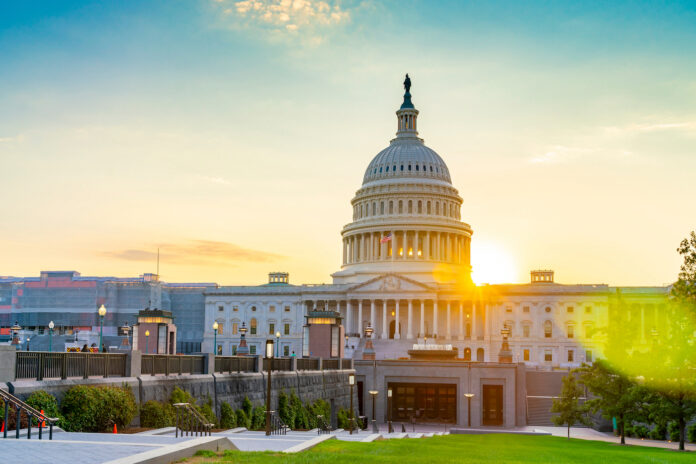WASHINGTON D.C. – Congressmembers are sending positive signals about a modified version of a federal banking bill that would benefit the cannabis industry. The House seems poised to approve the Secure and Fair Enforcement (SAFE) Banking Act for the eighth time, while key senators from both sides of the aisle appear committed to getting it through the 118th Congress.
Sens. Jeff Merkley (D-OR) and Steve Daines (R-MT), along with Reps. Dave Joyce (R-OH) and Earl Blumenauer (D-OR), reintroduced the bill as the SAFE Banking Act of 2023, highlighting Washington’s strong bipartisan support for common-sense legislation a majority of voters from all political parties support. If passed, the bills would ensure legal cannabis businesses can access traditional business banking and financial services.
Senate Majority Leader Chuck Schumer (D-NY) said he has “worked very hard to make progress on SAFE Banking Plus,” ensuring the Senate version of the bill contains critical criminal justice provisions like expungement for certain low-level cannabis-related offenses.
“We have a moral responsibility in Congress to undo the terrible damage caused by the war on drugs, and almost always has affected people of color,” said Schumer. “So I am going to work very hard with my colleagues to make sure criminal justice provisions are part of SAFE Banking when it reaches the floor.”
But the 2023 version of the bill would do more than allow cannabis businesses access to basic banking services. New provisions would extend safe harbor protections to Community Development Financial Institutions and Minority Depository Institutions, allowing them to offer cannabis businesses tailored resources and programs funded through federal dollars alongside private-sector investment to fuel economic growth and opportunity in some of the nation’s most underserved communities.
The bill also would prevent federal regulators from:
- Prohibiting, penalizing or discouraging a bank from providing financial services to a legitimate state-sanctioned and regulated cannabis business, or an associated business (such as a lawyer or landlord providing services to a legal cannabis business).
- Terminating or limiting a bank’s federal deposit insurance primarily because the bank is providing services to a state-sanctioned cannabis business or associated business.
- Recommending or incentivizing a bank to halt or downgrade providing any kind of banking services to these businesses.
- Taking any action on a loan to an owner or operator of a cannabis-related business.
In addition, the legislation would protect banks, their officers, and employees who provide financial services to state-legal cannabis businesses from criminal prosecution, liability, and asset forfeiture. If passed, banks and financial intuitions could still deny their services to cannabis businesses, especially if the expensive, time-consuming reporting required to stay in compliance with current Financial Crimes Enforcement Network (FinCEN) guidance is not streamlined effectively.
“This legislation will save lives and livelihoods. It is past time that Congress addresses the irrational, unfair, and unsafe prohibition of basic banking services to state-legal cannabis businesses,” said Blumenauer. “The House has passed the SAFE Banking Act on a bipartisan basis seven times. I am delighted that the Senate is joining us in making it a priority.”
According to Merkley, “Forcing legal businesses to operate in all-cash is dangerous for our communities; it’s an open invitation to robbery, money laundering, and organized crime—and it’s way past time to fix it. For the first time, we have a path for SAFE Banking to move through the Senate Banking Committee and get a vote on the floor of the Senate.”
Democrats and Independents hold a 51-49 majority in the Senate, but passing the standalone bill requires 60 votes. With five Republicans listed as cosponsors, an additional four would be needed to pass the legislation and avoid a potential filibuster—assuming all Democrats and Independents vote together.
According to Aaron Smith, co-founder and chief executive officer at the trade group National Cannabis Industry Association, senators in the 118th Congress are building upon negotiations that started last year, which should play a role in helping the legislation advance through key steps like approval from the banking committee.
“The pressure is mounting to do something substantive on this critical issue, as the number of states with cannabis markets—and the senators representing those states—increases,” said Smith. “It’s imperative that all cannabis businesses play a role in the critical advocacy work needed to ensure SAFE Banking Act and other legislative solutions are prioritized this year.”
The Senate Banking Committee is led by Chairman Sherrod Brown (D-OH) and ranking member Tim Scott (R-SC), with 23 members including freshman Senator John Fetterman (D-PA) who ran hard on cannabis legalization during his 2022 campaign. Cannabis advocacy organization NORML gave Brown a C letter grade and Scott a D letter grade for their support of cannabis-related reform.
“Brown has his heart in the right place, and there are a lot of opportunities to improve the legislation being considered, but there is a growing recognition that cannabis policy reform is going to happen incrementally in a divided Congress,” said Morgan Fox, political director at NORML.
In December during the final days of the 117th Congress, Brown indicated growing support for the Senate’s version of the bill, which included a number of equity provisions like expungement funds and mortgage access. He told Punchbowl News’s Brendan Pederson he expected his committee to “take it up and get it through” in 2023. He has said he’s interested in passing the banking act, but only if it’s tied to other issues like sentencing reform, which would mean working with the Senate Judiciary Committee.
“I am willing to look at moving on the SAFE Act, but with it needs to come sentencing reform,” Brown said in 2021. “I don’t think we move on legalization the way that Colorado and some other states want us to, unless we really look more seriously at who’s in prison for how long for those kinds of offenses and we don’t do one without the other.”
With Schumer’s progress on SAFE Banking Plus, which includes the types of criminal justice reform Brown wants to see, the Senate does appear on track to align with the House in voting on, if not passing, the bill.
“In the 117th Congress, substantive incremental legislation didn’t get an opportunity in the Senate until it was basically too late when it was tied to must-pass legislation,” said Fox. “Bad timing and opposition to adding these provisions to larger spending bills, in particular by Mitch McConnell, created a perfect storm for inaction. But there is a solid pathway for reform with the 118th Congress.”
Who supports the legislation?
In the Senate, the SAFE Banking Act is cosponsored by Jacky Rosen (D-NV), Bill Cassidy (R-LA), Kirsten Gillibrand (D-NY), Cynthia Lummis (R-WY), Brian Schatz (D-HI), Lisa Murkowski (R-AK), Edward J. Markey (D-MA), Kevin Cramer (R-ND), Ben Ray Luján (D-NM), Dan Sullivan (D-AK), Catherine Cortez Masto (D-NV), Rand Paul (R-KY), Angus King (I-ME), Tammy Duckworth (D-IL), John Fetterman (D-PA), Ron Wyden (D-OR), Kyrsten Sinema (I-AZ), Alex Padilla (D-CA), Dick Durbin (D-IL), Peter Welch (D-VT), MarkKelly (D-AZ), Michael Bennet (D-CO), Patty Murray (D-WA), Tina Smith (D-MN), Amy Klobuchar (D-MN), Elizabeth Warren (D-MA), Tim Kaine (D-VA), Debbie Stabenow (D-MI), Bernie Sanders (I-VT), Bob Menendez (D-NJ), Chris Coons (D-DE), John Tester (D-MT), Mark Warner (D-VA), Martin Heinrich (D-NM), John Hickenlooper (D-CO), Mazie Hirono (D-HI), Gary Peters (D-MI), and Chris Murphy (D-CT).
In the House, the SAFE Banking Act is cosponsored by Warren Davidson (R-OH), Jim Himes (D-CT), Brian Mast (R-FL), Barbara Lee (D-CA, Guy Reschenthaler (R-PA), Nydia Velázquez (D-NY), Lori Chavez-DeRemer (R-OR), and Lou Correa (D-CA).












[…] display of bipartisan support, the Secure and Fair Enforcement Regulation (SAFER) Banking Act passed through the Senate Banking Committee, clearing the way for a full-chamber vote. This is […]
[…] then, SAFE has bounced around in various House and Senate committees and passed in the House seven times. Recently, a slightly […]
[…] SAFER Act closely resembles similar legislation, the Secure and Fair Enforcement (SAFE) Act, that has passed the House with bipartisan support seven times. Both bills would provide “safe […]
[…] House Welcomes, Senate Warms Up to New SAFE Banking Act […]